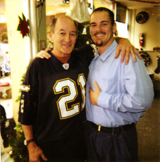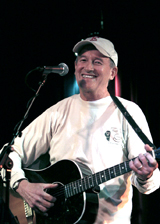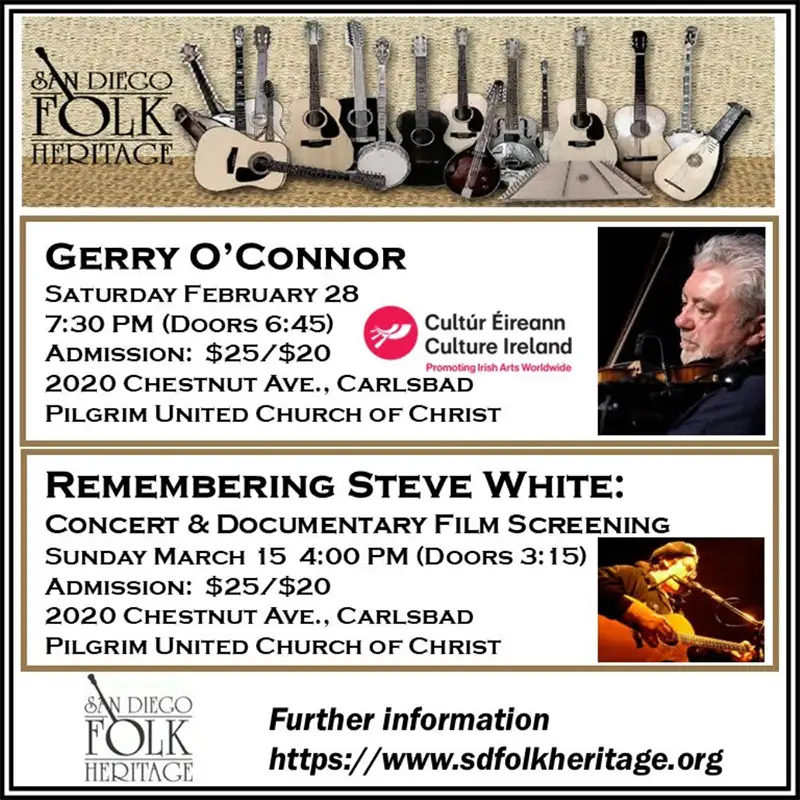Featured Stories
One Voice Through Another: Old Man Fred

Old Man Fred with his son Jack

Old Man Fred performing at an open mic. Photograph by Dennis Andersen.
There are only a few, I believe, ‘prerequisites’ for being an open mic host, and none of them are what you would immediately imagine: tenacity, stamina, and a love of people before music. I’ve also never known a pursuit that can vary so wildly from one night to the next. Were you to ever seriously consider taking-up this honorable mantle ‘ I say ‘honorable’ as the position is akin to being a part-time ‘musical social worker’ ‘ one of the less desirable habits you will almost certainly develop is the process of profiling an artist based on how they act before taking the stage. ‘Why that’s awful,’ I hear you gasp, but allow me to elaborate. A usual open mic can see anywhere from 10 to 40 performances per night (and that doesn’t account for all the histrionics outside the venue on the sidewalk), multiply that by the number of years you’ve hosted ‘ in my case five ‘ and you might give me a little more credit for having had enough interactions to justify this prejudice. So yes, what I’m really saying is that I’ve seen it all. Luckily, another prerequisite for being an open mic host is to know when you’re wrong and having the humility to accept it very quickly.
All of the above came in to play for my diagnosis, a few months ago, of an older gentleman who walked into the Mueller College open mic I host. He was incredibly polite and appeared to be suppressing his probably quite shy nature in the name of the art inside him. When he eventually took the stage what came next was so completely unexpected and hit me at such a deeply profound level that I felt a very definite sense of privilege to have witnessed it. You see, most performance artists are in it for themselves. I don’t care how you try to justify it, there’s always a degree of self-centeredness that goes along with what we do. I don’t believe I’d ever have highlighted this so distinctly for myself until I met the exception to the rule: Old Man Fred.
After I’d introduced him, he told the small audience that he is not a guitar player, he is not a singer, and he is not a songwriter. He was there to perform the songs written by his son, Jack, who couldn’t do so himself, as he is currently seven years into a ten-year prison sentence. He performs as ‘Old Man Fred’ because that’s what Jack calls him. Hang on. Are you telling me that this man has learned to sing, play guitar, AND take it outside his home environs to perform in an attempt to keep his incarcerated son and the art he creates connected to the outside world? Wow. Not only was this one of the most beautifully compelling stories I’d heard in a very long time, as I listened I realized something else: the songs Old Man Fred performed were all incredible.
When he was finished, I approached Fred and asked if he’d mind sharing his and his son’s story for the Troubadour, to which he modestly replied, ‘That would be fine.’ Our conversation continued a week later in a vastly different location: 11 floors up into one of San Diego’s most prominent business high-rises, in a corner office boasting one of the best southern views I’ve ever seen looking across the city.
Fred Phillips grew up with his three siblings on a farm in Iowa, the son of a farmer/packinghouse worker and a schoolteacher. At 15 he won a scholarship to a private boarding school in New Hampshire, from which he continued on to attend Stanford Law School. In the 1970s he, his first wife, and their two children moved to San Diego, where he has remained.
While Fred had had the odd brush with music ‘ a little guitar and piano here and there in high school and college ‘ it never led to anything formal. As most do, he got on with life, got married, started a family, and carried that responsibility. He married Chris in 1980. With two children from his first marriage and two from hers, the final addition of Jack in 1982 ‘ their only child together ‘ their household was a hectic place, and the couple got on with raising their family.
The eldest son, Christopher, showed somewhat of a musical flare by taking up the saxophone and joining a band in high school as well as dabbling in a little guitar. This piqued the interest of Jack who took up the guitar himself at 15. Fred picked up his guitar again around the same time just so he could play with the boys.
While the other kids in the family went to college, got their degrees, and began lives of their own, Jack attended college for one semester before dropping-out. He kicked around for a little while before he ‘got it together’ and focused on his true love: acting. He was admitted into the American Academy of Dramatic Arts in Hollywood, where he excelled into his second and final year. That was until he had one very bad night.
It was his roommate’s twenty-first birthday and a friend of his came up from San Diego to celebrate. The three of them drank in the apartment before driving out to a club in West Hollywood. (This was the last thing Jack remembers before blacking out. The rest of the story has been pieced together over time from witnesses and Internet comments that followed the news story.) The group continued their binge until Jack got into a brawl with a group of musicians. Retrieving a gun from his vehicle (that he’d apparently procured for protection in the neighborhood he resided in), Jack returned to the venue to confront his attackers. He was attacked again, this time by a mob of people; he took out the gun and fired it.
He wounded two people in the process, one in the knee, the other in the foot. The crowd beat him up again, this point until he was unconscious. Eventually the ambulances came and took him to hospital before they took him to jail. Hours after the fact, Jack’s blood alcohol was recorded at .28. Jack was charged with two counts of attempted murder and the family spent the next 15 months embroiled in legal proceedings to reduce the original sentence proposed by the prosecution: 25 years to life. Eventually a deal of 10 years was offered, which they accepted.
Fortunately, during the time that Jack’s legal woes continued, his family was able to have him released on bail so that he could attend live-in drug and alcohol rehabilitation, which helped him immensely. He came back to San Diego where he attended further counseling and made all the necessary mental preparations before going to prison.
It was during this time that Fred and Jack began to play a lot of music together. It was also during this time that Jack’s musical focus shifted away from rap music and began to hone in on country music. I asked Fred if he felt this shift was circumstantial, to which he responded, ‘There’s no way to know. I think that life is so serendipitous. All the things you do, the forks in the road’ things just ‘happen.”
Having had this time together, a process evolved whereby Jack documented his trajectory through the state prison system in his songs and passed them on to his Father. While sending the lyrics and chords by mail would be somewhat helpful, they wouldn’t mean a lot to Fred until he could hear them. Jack would then make a collect call from prison where he’d sing the song over the phone and Fred would capture it on a dictaphone. Fred would then transcribe the music on piano before learning it on the guitar. Fred recalls, ‘This was actually quite a fun exercise for us to do together. We started-off with about 10 or 15 of them and I’d just work on them until I knew them. Eventually it got to the point where we had 50 or 60 of them ‘ I’d be comfortable performing 45 or so today.’
As any performer can attest, there’s a huge divide between playing songs for yourself at home and performing them for an audience in a venue ‘ especially when drawing from such a wide original calalogue. This is something that Fred was initially keenly aware of.
Tim Mudd: Was there a moment for you where you just said, ‘I need to go and play these songs,’ or was it more of a gradual process?
Old Man Fred: It was a gradual process, because it took me a while before I was thinking, ‘Gosh, can I actually get up there and do this?’
And what was your motivation for finally getting out there?
I want people to know’ I want Jack to know that I just think his songs are really good. That’s all.
In this process have you found that you’ve started writing yourself?
You know, I have a little bit. I’ve edited some of his songs, but I just don’t have the talent he does. And maybe that’s a function of time, too; as you can see (looks around the office) it gets so hairy with all of these things we do to keep food on the table. I’d like to write songs, but I don’t know if I have the ability to do that or not.
Nevertheless, it sounds like it’s a pretty strong hobby for you.
Yes. Yes it is.
Does Jack have any aspirations at this point? Is he sitting there, plotting world domination with his music?
No. He’s actually very frightened because he feels as though he’ll be 31 years old with no skills when he gets out. He is smart. He’s just about finished with a paralegal course, which is good, but it’s very hard to get anything on the inside. They’re supposed to have programs but in practice they don’t. He’s been trying to get into a correspondence program so that he can get a junior college degree, but budgets keep getting cut and there’s little incentive to set up new programs.
That’s an interesting topic for a whole other interview, probably for a different publication.
It’s a real eye opener. It’s opened me up to a whole other world that I knew of but I hadn’t really thought about.
So he’s not sitting there thinking, ‘I’ve really got something with this music?’
No. What’s interesting is the closest he comes to it is when I go around to perform at the open mics because it’s a great chance to just sit there and write to him. He writes almost every day to his mother, and she responds in kind. I’m lucky if I can get one letter out to him in a week, but waiting to perform at the open mic is a great chance to just sit and write stuff; talk about it, talk about his songs and the reaction of people to him. He loves that. He talks about going out and playing some open mics together when he gets out ‘ that’s a really nice idea for me.
Have you noticed a growth in your communication as father and son?
We talk about that all the time. I’ve said to him on more than one occasion, ‘You know, when this happened, I felt like you were somewhat of a jerk, I didn’t like you all that much, and I’m sure you didn’t like me, and we may never have been close. We are now.’
As I mentioned in the beginning of this article, every time Old Man Fred gets up on stage he starts his performance by telling Jack’s story as well as informing the audience that he’s not very good at either playing guitar or singing. Apparently he does so to ‘lower expectations,’ but his true reasoning is that he wants people to focus on the songs, not the man singing them. The thing is, the songs are so good that it’s hard to focus on anything else.
Jack’s songs also have the ability to spread further than simply hearing them accompanied by a tragic story at an open mic’ A couple of weeks after this interview I was chatting with our very own local purveyor of ‘California Browngrass,’ Tommy Dahill, who spoke of his experience driving in central California around San Luis Obispo and being reminded of Jack Phillips when he came across a solitary stop light atop a hill. It was the very same stop-light Jack had written about, visible from the California Men’s Colony state prison that housed him, in his song ‘Light on the Hill.’ It’s a powerful song that can help anyone recall a story, in an instant, hundreds of miles outside of the context in which you originally heard it.
There’s nothing worse than talent that’s unrecognized, no matter what the circumstance, and it is my sincere hope that Jack’s gift is embraced with and beyond this article. If there’s some support from our local music community here in San Diego when he’s back on this side of the walls that hold him, I imagine it would be a phenomenal boost for him to know that he hasn’t wasted the time that he’s been away. He has been productive and achieved something very special.
At the same time, I also feel Old Man Fred should give himself more credit for his talent, tenacity, stamina, and love for keeping Jack’s story alive.
Letter from Jack
The following is part of a letter from Jack to his father, which Fred shared with me during our interview to illustrate the expressive way in which he writes:
”Aw man, Pop, I guess that’s it for now. I’ll talk to you soon because we should be getting program this week. It’s been a long time down, my man. [This particular letter was accompanied with a song] This song really does say it. I’m so tired Da. It’s impossible to express in words the feeling I get when I wake up every morning and have to start the fight all over again. Nobody said it would be easy, but nobody ever said it would be this hard. I’m trying to be good man, trying to find the positive, trying to love my brothers, but this place’ it’s hard damn work Freddy. It’s like ol’ Dostoyevski says in the Brothers K, ‘It’s easy to love men from a distance, it’s when you get close, smell the stench, see the filth ‘ that’s when it’s hard to love. It’s also the best kind of love.’ I’m doing my best. Three more years, we’ll be on the pigs back then, won’t we Da? You’re loving son, Jack.’
Tim Mudd is the web director and online content manager for CBS Radio San Diego. He’s also a seasoned member of the San Diego singer-songwriter community and leads the Anglo-Americana group For Strangers & Wardens. He hosts ‘Tim Mudd’s World Famous Open Mic (currently in cult status)’ every Wednesday night at 8pm, Across the Street at the Mueller College Performance Center, which he is also the Mayor on Foursquare. He’s also known to occasionally spend five minutes at home with his girlfriend, Jen, and their two cats.







